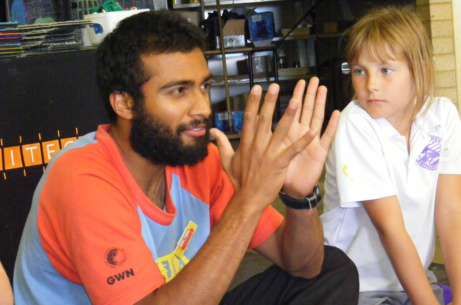
Niraj Lal has been given a gold award in recognition of his volunteering work.
Niraj Lal is having a double celebration this week after winning a gold award for his voluntary education outreach work and having a paper on his solar power research published in the world’s leading condensed matter physics journal.
Niraj was awarded a UK Student Volunteering Gold Award from the Office of External Affairs at the University of Cambridge.
Dr Matt Hawkeye from the Department of Physics, who nominated Niraj for the award, said: “Niraj has by far demonstrated the strongest commitment to volunteerism and public outreach of any student I have worked with or supervised.”
He cited in particular how Niraj had developed a public lecture on ‘The Science of Electricity’. He said: “It was delivered with Niraj’s inimitable energy and packed with audience participation and physical demonstrations.”
Over the past three years Niraj has performed his lecture for a wide range of audiences including ethnic minority summer schools, in-care students, village colleges, mature-age students, international summer schools and the general public.
He has also volunteered at the Wysing Arts Centre helping disadvantaged students from Cambridgeshire produce a film about ‘Science of the Future’, worked with the BBC Radio Naked Scientists on the science of solar energy, and volunteered at the Royal Society Science Exhibition in London.
Dr Hawkeye continued: “Niraj’s passion for volunteering extends beyond science as well. Niraj is Clare Hall College’s Amnesty International representative, an active member of the Australian Greens and the British Humanist Association, and volunteered with the Cambridge Community Café project.”
Niraj, who is doing a PhD in Physics, is co-author of the paper, Using spacer layers to control metal and semiconductor absorption in ultrathin solar cells with plasmonic substrates, which was published this week in Physical Review B.
His PhD research focuses on nanovoid plasmon-enhanced photovoltaics and aims to make solar cells more efficient.












